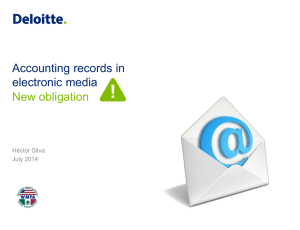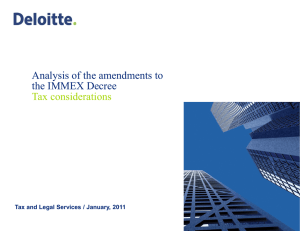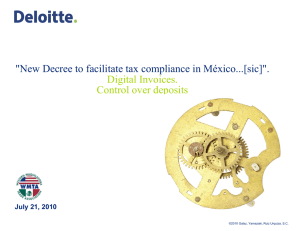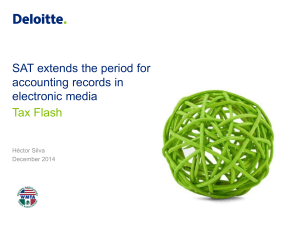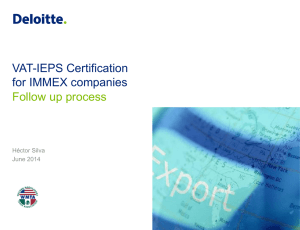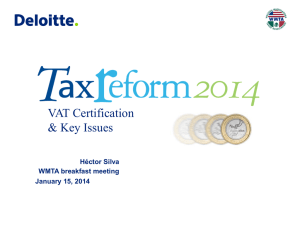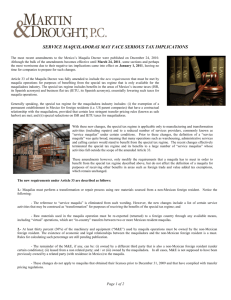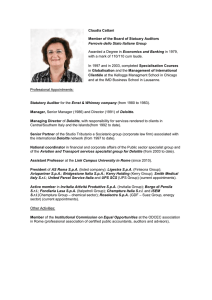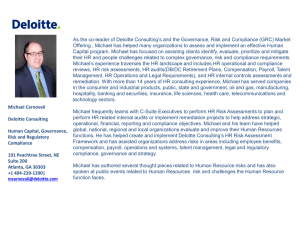Hector Silva, Tax Partner and Blanca Montano Rique, from Deloitte
advertisement
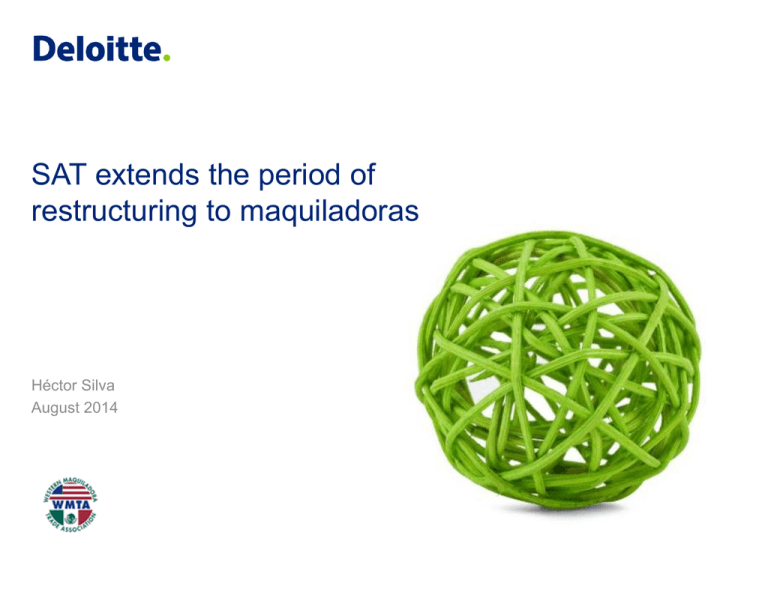
SAT extends the period of restructuring to maquiladoras Héctor Silva August 2014 Restructuring to maquiladoras New Rules On July 4, 2014, the Second Amendments to Miscellaneous Tax Resolution for 2014 and its Annexes 1, 1-A, 2, 3, 6, 11, 14, 15, 18, 22, 23 and 24, were published in the Official Gazette. An extension for maquiladoras to restructure their operations and meet the requirement that the income from their productive activities is derived exclusively from maquila operations is included in these rules. Also provisions applicable to maquiladoras to mitigate some of the adverse effects introduced in the Income Tax Law and Miscellaneous rules are included. © 2014 Galaz, Yamazaki, Ruiz Urquiza, S.C. 2 Restructuring to maquiladoras Income Tax Law The Income Tax Law tightened the requirements for a company to qualify as a maquiladora for purposes of income tax and allow to prevent the foreign contractor to establish a Permanent Establishment, and also reduced the benefits for maquiladoras. The requirements under the income tax law include: A maquiladora must earn all of its revenue from their productive operations exclusively maquila activities. The goods subject to processing by the maquiladora must be temporarily imported and subsequently exported (either physically or through the virtual program exports) once the maquila services are completed. Switching to a permanent importation will eliminate the PE protection. © 2014 Galaz, Yamazaki, Ruiz Urquiza, S.C. 3 Restructuring to maquiladoras Income Tax Law The foreign residents that celebrate the maquila services contract agreement must provide at least 30% of the M&E used in the maquila operation. And that M&E should not have been owned (currently or previously) by the maquiladora or Mexican related party. (Maquiladoras that operated under the maquila regime prior to December 31, 2009 were granted an extension of two years to meet the requirement of 30%). These recent changes are the result of the continuous process of negotiation by the Association of Maquiladora Export Industry (INDEX) with the tax authorities. © 2014 Galaz, Yamazaki, Ruiz Urquiza, S.C. 4 Restructuring to maquiladoras Maquila services The income tax law indicates that for a company to qualify as a Mexican maquiladora and be eligible for special regime (including PE protection for the foreign contractor), all revenues from their productive activities must come exclusively from the export of services maquila; Income shall be considered to result exclusively from the export of such services if it is derived from the provision of maquila services (or income related to such services). The Miscellaneous rules published on April 30, 2013 established a deadline of June 30 of 2014 to restructure or segregate their activities of non maquiladora services income. Meanwhile, all revenues qualify as income derived exclusively from their maquiladora activities, provided accounting records will enable to differentiate each type of income. (and the costs associated with each type of income) © 2014 Galaz, Yamazaki, Ruiz Urquiza, S.C. 5 Restructuring to maquiladoras Extension of the deadline to segregate national market sales Maquiladoras have faced many challenges in restructuring its operations and segregate their sales to Mexican customers within the short period of six months granted by the rules December 2013. As a result, tax authorities extended the deadline for restructuring / segregation to October 1, 2014 the extension will be granted if the continuous maquiladora maintaining accounting records to differentiate each type of income and the cost associated with such income. However, from 1 October 2014 maquiladoras must meet the requirement that all of the income from production activities derives from its maquila operations. © 2014 Galaz, Yamazaki, Ruiz Urquiza, S.C. 6 Restructuring to maquiladoras Maquiladora income The new rules also clarify that the revenue from their productive activities include income for services of personnel, lease / sale of land and building, interest, sale of the waste materials that arose in their production activities and other maquila income related to operation, provided they are different to those obtained for the sale and distribution of products. This arrangement would apply only if the following conditions are met: That the sum of revenues described above (excluding linked from the sale of land and building) as a whole does not exceed 10% of the total amount of revenue from its maquila operation. That segments in the accounting the information corresponding to the maquila operations and other related activities and identify each of the costs. © 2014 Galaz, Yamazaki, Ruiz Urquiza, S.C. 7 Restructuring to maquiladoras Maquiladora income This arrangement would apply only if the following conditions are met: That if such transactions are conduit with related parties, compliance with Transfer Pricing regulations are met. That the corresponding information be reported in the informative statement "DIEMSE" corresponding to these revenues, disaggregated information for each item. © 2014 Galaz, Yamazaki, Ruiz Urquiza, S.C. 8 Restructuring to maquiladoras Maquiladora income The addition of these miscellaneous rules also makes the following clarifications: In the case of revenue from the sale of immovable property, the maquiladora company must give notice by writing to the Free Central Management Transfer Pricing Control, exposing the business reason that gave rise to such action, and indicate the amount and percentage this operation represents to the total revenue of maquila services, also relevant documentation and evidence that the goods where used in the maquila operation must be provided. The revenue from the provision of personnel services, must come exclusively from related parties of the maquiladora. As for the revenue derived from rents obtained from unrelated parties, the maquiladoras have a maximum period of three years from the date of commencement of such contracts to end this operation,. This timeline does not apply if any leases held prior to January 1, 2014 in which a longer period is contemplated to above, in no case it may extend the term of such contracts. © 2014 Galaz, Yamazaki, Ruiz Urquiza, S.C. 9 Restructuring to maquiladoras Maquiladora income The maquiladora can not apply the Safe Harbor or APA option to cover any of the revenue from these extra-maquila activities. © 2014 Galaz, Yamazaki, Ruiz Urquiza, S.C. 10 Accounting records in electronic media New Obligation New Rules As of July, 2014 there is an obligation to upload accounting information into the SAT’s webpage via the Tax Mailbox for: • Taxpayers obligated to keep accounting records, shall keep the records in an electronic system with the ability to generate XML files. • Except those who register their operations in the electronic tool "Mis Cuentas“(small taxpayer who cannot afford their own software may use the authorities bookkeeping tools in “Mis Cuentas” – in other words they may keep their accounting records on line with the authorities platform), © 2014 Galaz, Yamazaki, Ruiz Urquiza, S.C. 11 Accounting records in electronic media New Obligation XML files to generate Chart of accounts used in the period. • This chart will be added a field with the grouping code of SAT´s accounts contained in Annex 24. Trial Balance including beginning balances, movements of the period and ending balances of all and each of the accounts of assets, liabilities, P&L accounts, capital and memorandum accounts. • In the case of the balance of the year end, it shall include the information on adjustments that are recorded for tax purposes. • All taxes should be identified, by rates, fees and activities not levied for tax purposes; as well as transferred tax actually collected and creditable taxes actually paid in accordance with Annex 24. © 2014 Galaz, Yamazaki, Ruiz Urquiza, S.C. 12 Accounting records in electronic media New Obligation XML files to generate Information of the journal entries, including transaction detail, account, subaccount and item, as well as its auxiliary reports. Journal entry In each journal entry: It must be possible to distinguish the CFDI supporting the various transactions; It should also be possible to identify the different tax rates and activities not levied for tax purposes. In operations with related third parties, the tax ID number (RFC) shall be included in accordance with Annex 24, paragraph D. © 2014 Galaz, Yamazaki, Ruiz Urquiza, S.C. 13 Accounting records in electronic media New Obligation Compliance with the monthly provision of accounting records in electronic media Taxpayers obligated to keep accounting records, except those who register their operations in the electronic tool “Mis cuentas” should share it through the Tax Mailbox in accordance to the following periods: The chart of accounts as specified in the applicable rule. • Provided once in the first delivery and subsequently each time the chart is modified. Monthly, in the month immediately after the corresponding data, relative files to the trial balance, as follows: • Legal entities, by the 25th of the following month. • Individuals, by the 27th of the following month. © 2014 Galaz, Yamazaki, Ruiz Urquiza, S.C. 14 Accounting records in electronic media New Obligation Compliance with the monthly provision of accounting records in electronic media (2) The file corresponding to the year-end information in which the adjustments are included for tax purposes: • Legal entities, not later than April 20 of the year immediately following. • Individuals, not later than May 22 of the year immediately following. © 2014 Galaz, Yamazaki, Ruiz Urquiza, S.C. 15 Accounting records in electronic media New Obligation Start of the obligation to provide the accounting records through Tax Mailbox and its provision at the request of the authority These obligations will be applicable to the legal entities from the month of July 2014; Notwithstanding the foregoing, information of the trial balance concerning the months from July to December 2014, should be uploaded during January 2015 (according to the draft of the third amendment to the Miscellaneous Tax Resolution, no official publication has been made) However the information corresponding to the chart of accounts must still be provided to the authority by October 2014. © 2014 Galaz, Yamazaki, Ruiz Urquiza, S.C. 16 Accounting records in electronic media New Obligation Recommendations Debug the chart of accounts (delete accounts that are not used or revise the accounts names) Revise that the journal entries comply with all requirements If records are not conducted in Spanish, change the language Register e-mail accounts at the Tax Mailbox Assign a person responsible for checking e-mail in the tax Mailbox © 2014 Galaz, Yamazaki, Ruiz Urquiza, S.C. 17 Accounting records in electronic media New Obligation Unconstitutionality of the monthly provision to SAT of the electronic accounting records through the Tax Mailbox From a legal point of view, the obligation to make available to the authorities the accounting records in electronic media has far-reaching implications, both the private nature of the information to be provided to the tax authority and the surrendering of information not following the parameters established by the Constitution, as well as the administrative burden implied, which should be properly regulated from the law itself. These issues could be subject to constitutional scrutiny through an Injunction (Amparo) trial, so that the Judicial Power of the Federation, decide whether or not the procedures departs from the fundamental rights under the Constitution. © 2014 Galaz, Yamazaki, Ruiz Urquiza, S.C. 18 Accounting records in electronic media New Obligation Unconstitutionality of the monthly provision to SAT of the electronic accounting records through the Tax Mailbox These issues could be subject to constitutional scrutiny through an Injunction (Amparo) trial, so that the Judicial Power of the Federation, decide whether or not the procedures departs from the fundamental rights under the Constitution. The Injunction Trial has a limit of presentation of 15 business days after the day of which the information was presented or when the deadline was met. (In the case the presentation of the chart was on October 31, the 15 business days will be completed on November 21). © 2014 Galaz, Yamazaki, Ruiz Urquiza, S.C. 19 Héctor Silva Rodríguez Tax Partner 011 52 (664) 622 7840 hsilva@deloittemx.com Deloitte se refiere a Deloitte Touche Tohmatsu Limited, sociedad privada de responsabilidad limitada en el Reino Unido, y a su red de firmas miembro, cada una de ellas como una entidad legal única e independiente. Conozca en www.deloitte.com/mx/conozcanos la descripción detallada de la estructura legal de Deloitte Touche Tohmatsu Limited y sus firmas miembro. Deloitte presta servicios profesionales de auditoría, impuestos, consultoría y asesoría financiera, a clientes públicos y privados de diversas industrias. Con una red global de firmas miembro en más de 150 países, Deloitte brinda capacidades de clase mundial y servicio de alta calidad a sus clientes, aportando la experiencia necesaria para hacer frente a los retos más complejos de los negocios. Cuenta con alrededor de 200,000 profesionales, todos comprometidos a ser el modelo de excelencia. Tal y como se usa en este documento, “Deloitte” significa Galaz, Yamazaki, Ruiz Urquiza, S.C., la cual tiene el derecho legal exclusivo de involucrarse en, y limita sus negocios a, la prestación de servicios de auditoría, consultoría fiscal, asesoría financiera y otros servicios profesionales en México, bajo el nombre de “Deloitte”. Esta publicación sólo contiene información general y ni Deloitte Touche Tohmatsu Limited, ni sus firmas miembro, ni ninguna de sus respectivas afiliadas (en conjunto la “Red Deloitte”), presta asesoría o servicios por medio de esta publicación. Antes de tomar cualquier decisión o medida que pueda afectar sus finanzas o negocio, debe consultar a un asesor profesional calificado. Ninguna entidad de la Red Deloitte, será responsable de pérdidas que pudiera sufrir cualquier persona o entidad que consulte esta publicación.
